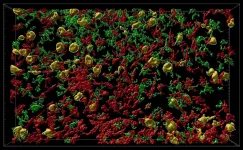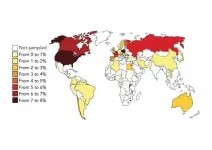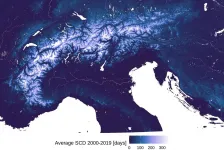Artificial intelligence system can help prevent anemia in patients undergoing hemodialysis
Scientists developed a decision support system that relies on expert opinion to prevent anemia in patients with kidney disease
2021-03-18
(Press-News.org) Anemia, a condition characterized by the lack of healthy red blood cells in the body, is common in patients with chronic kidney disease who need to undergo routine hemodialysis (a process that helps to "clean" the blood when the kidneys don't function well). Thus, red blood cell-stimulating agents (called "erythropoiesis-stimulating agents" or ESAs) and iron supplements (ISs) are administered as part of this process. But, complications can arise if the patients have an altered iron metabolism or poor response to medications. Moreover, the medications tend to be expensive and impose a heavy financial burden on public health. Thus, with such patients currently on the rise but not enough physicians suitably trained to administer treatment, additional support systems with smart decision-making capabilities are highly sought after. One option is to turn to artificial intelligence (AI), which seems promising but demands a large dataset and is not practical owing to diverse health conditions of patients.
So, can something be done to improve the situation? In a recent study published in the International Journal of Medical Sciences, medical researchers from Japan tried to find the answer. They came up with a new approach: instead of making the AI learn from the complex physiology of the patient's body, they opt for a prediction model based on the decisions of experienced physicians. Assistant Professor Toshiaki Ohara from Okayama University, Japan, the lead scientist on the study, explains, "We got the idea while contemplating the thought process of seasoned physicians. After all, they do not calculate detailed values of vital reactions in a patient's body when deciding dosages, which means prediction models based on biochemistry are not necessary."
The researchers started off by collecting clinical data at two hospitals in Japan and then preparing two datasets for each hospital: one for training their model and the other for testing and validating its predictions. Simultaneously, they recorded the dosage directions of physicians at both hospitals and considered responses for the two medications used during hemodialysis: ESAs and ISs.
Based on these, they constructed an AI-based model called an "artificial-intelligence-supported anemia control system" (AISACS), which received a total of five inputs (four items of blood examination and dosage history) and churned out dosage direction probabilities for the two medications as outputs. In addition, to make the training process more efficient, they compensated for the time lag between blood examination and dosage decisions by using "data rectification" to match the decision dates with the examination dates.
To the researchers' delight, AISACS showed a high prediction accuracy with correct classification (directions matching those of physicians) rates of 72%-87%. But what was even more interesting was that it provided "clinically appropriate" classifications at even higher rates (92%-97%). These were directions that didn't match those of physicians (and were sometimes provided ahead of them) but were still considered appropriate from a medical viewpoint.
With these results, researchers are hopeful about AISAC's future prospects. "By preventing anemia, our system can help alleviate the burdens on physicians and medical insurance systems. Moreover, it has the potential to share the knowledge and experiences related to medications," comments an excited Dr. Ohara.
Hopefully, this new AI-based approach provides some hope to both patients undergoing hemodialysis and physicians treating them.
INFORMATION:
[Attachments] See images for this press release:

ELSE PRESS RELEASES FROM THIS DATE:
2021-03-18
Malting, the processing of cereal grains into malt, generates rootlets as a side-stream product, which is currently mostly utilised as animal feed. However, this leftover material has not only a high protein content, but also high amounts of phytochemicals, which makes it a highly potential source of development for the food industry, according to a recent study from the University of Eastern Finland, published in npj Science of Food.
Germination increased the amount of phytochemicals
The study utilised metabolomics to analyse samples from grains of four cereals typically used in malting: barley, rye, wheat, and oats. The researchers were particularly interested in phytochemicals, which are bioactive compounds ...
2021-03-18
Leesburg, VA, March 18, 2021--According to ARRS' American Journal of Roentgenology (AJR), contrast-enhanced mammography (CEM) showed concordance with MRI in women with newly diagnosed breast cancer and breast augmentation.
Noting that CEM has not been investigated in women with breast augmentation, Molly Carnahan and her Mayo Clinic team in Phoenix, AZ, concluded, "the findings suggest a possible role of CEM for staging in women with breast augmentation and contraindication or limited access to MRI."
From an institutional database of 2,215 women who underwent ...
2021-03-18
The immense diversity in the living world and how it came into being has always been a subject of human enquiry. After centuries of playing detective in search of the basis of the parities and disparities that we see among living beings around us, the past century stood witness to some marvellous discoveries in biology and today the Central Dogma of life has been disclosed to us: DNA makes RNA and RNA makes protein (a facile view of a much more complex sequence of events). Together with contributing environmental factors, proteome(s) (total protein content of a cell) collectively influence 'traits' or characteristics of organisms that vary among individuals of a population. In a population, individuals with traits better suited to their environment have a higher chance at survival ...
2021-03-18
BIRMINGHAM, Ala. - The triggers and causes of a severe scarring disease of the lungs -- idiopathic pulmonary fibrosis, or IPF -- remain unclear.
Now research published in Science Translational Medicine shows how cadmium and carbon black can trigger lung macrophages to produce a modified protein, citrullinated vimentin, or cit vim, which leads to lung fibrosis. Researchers from the University of Alabama at Birmingham and three other American universities also describe a sequence of mechanistic steps in lung macrophages and lung fibroblasts that leads to the lung scarring.
One of the enzymes involved in these steps -- peptidylarginine deiminase 2, or PAD2 -- may be a promising target to attenuate cadmium/carbon black-induced ...
2021-03-18
March 18, 2021 -- A study conducted at Columbia University Mailman School of Public Health reports a high global prevalence of both depression and anxiety during the COVID-19 pandemic and shows how implementation of mitigation strategies including public transportation and school closures, and stay-at-home orders impacted such disorders. The results are published in Psychological Medicine.
"Our research found an elevated global prevalence of these mental health issues during COVID-19 and also revealed there was a wide variance in each at the region- and country-level," said, João Castaldelli-Maia, MD, PhD, NIDA-INVEST Postdoctoral Fellow in the Department of Epidemiology, and ...
2021-03-18
Our knowledge of Alzheimer's disease has grown rapidly in the past few decades but it has proven difficult to translate fundamental discoveries about the disease into new treatments. Now researchers at the California National Primate Research Center at the University of California, Davis, have developed a model of the early stages of Alzheimer's disease in rhesus macaques. The macaque model, published March 18 in the journal Alzheimer's & Dementia: The Journal of the Alzheimer's Association could allow better testing of new treatments.
The model was developed by Professor John Morrison's laboratory ...
2021-03-18
IN BRIEF:
It's a first: approximately 100 scientists in 42 countries joined forces to learn about the incidence of parental burnout.
They found that Western countries are the most affected by parental burnout.
The cause? The often individualistic culture of Western countries. This international study, published in Affective Science, shows how culture, rather than socio-economic factors, plays a predominant role in parental burnout.
The individualism is more pronounced during health crises.
Does the incidence of parental burnout depend on a country's culture? This question was at the heart of the first international study on the subject for which hundreds of scientists in 42 countries mobilised. In other words, the global scientific ...
2021-03-18
The results, published in the renowned scientific journal The Cryosphere, have made it possible to reliably describe snow trends at up to 2000 metres above sea level. Higher than that, there are too few measuring stations to be able to extract reliable information for the entire Alpine region. This consistent data set spans five decades and was created through the collaboration of more than 30 scientists from each of the Alpine states. The results and data collected represent a valuable aid for future studies, especially those which centre on climate change.
"This ...
2021-03-18
Bottlenose dolphins learn to cope with coastal construction activities. That is the conclusion of a study published in END ...
2021-03-18
A large gathering of fish tempts harbour porpoises to search for food around oil and gas platforms, even though the noise from these industrial plants normally to scare the whales away. Decommissioned platforms may therefore serve as artificial reefs in the North Sea.
Harbour porpoises are one of the smallest of all whales and the only whale that with certainty breeds in Danish waters. The harbour porpoise was protected in 1967 in Danish Waters, and researchers from Aarhus University, Denmark, have previously shown that underwater noise from ships, and seismic surveys of the seabed scare the porpoises away.
A brand new study now shows that in some parts of the year there are ...
LAST 30 PRESS RELEASES:
[Press-News.org] Artificial intelligence system can help prevent anemia in patients undergoing hemodialysis
Scientists developed a decision support system that relies on expert opinion to prevent anemia in patients with kidney disease








